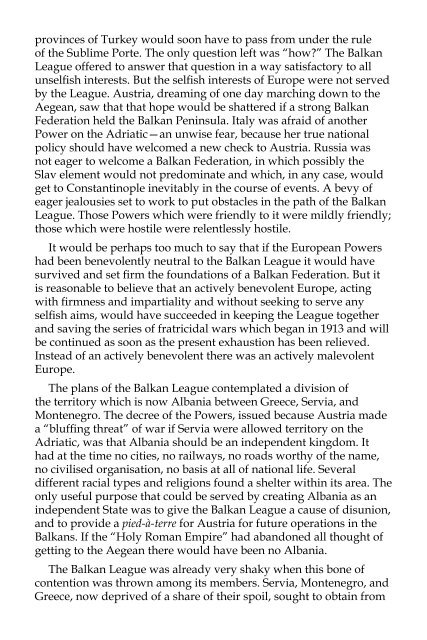Bulgaria e-book - iMedia
Bulgaria e-book - iMedia
Bulgaria e-book - iMedia
You also want an ePaper? Increase the reach of your titles
YUMPU automatically turns print PDFs into web optimized ePapers that Google loves.
provinces of Turkey would soon have to pass from under the rule<br />
of the Sublime Porte. The only question left was “how?” The Balkan<br />
League offered to answer that question in a way satisfactory to all<br />
unselfish interests. But the selfish interests of Europe were not served<br />
by the League. Austria, dreaming of one day marching down to the<br />
Aegean, saw that that hope would be shattered if a strong Balkan<br />
Federation held the Balkan Peninsula. Italy was afraid of another<br />
Power on the Adriatic—an unwise fear, because her true national<br />
policy should have welcomed a new check to Austria. Russia was<br />
not eager to welcome a Balkan Federation, in which possibly the<br />
Slav element would not predominate and which, in any case, would<br />
get to Constantinople inevitably in the course of events. A bevy of<br />
eager jealousies set to work to put obstacles in the path of the Balkan<br />
League. Those Powers which were friendly to it were mildly friendly;<br />
those which were hostile were relentlessly hostile.<br />
It would be perhaps too much to say that if the European Powers<br />
had been benevolently neutral to the Balkan League it would have<br />
survived and set firm the foundations of a Balkan Federation. But it<br />
is reasonable to believe that an actively benevolent Europe, acting<br />
with firmness and impartiality and without seeking to serve any<br />
selfish aims, would have succeeded in keeping the League together<br />
and saving the series of fratricidal wars which began in 1913 and will<br />
be continued as soon as the present exhaustion has been relieved.<br />
Instead of an actively benevolent there was an actively malevolent<br />
Europe.<br />
The plans of the Balkan League contemplated a division of<br />
the territory which is now Albania between Greece, Servia, and<br />
Montenegro. The decree of the Powers, issued because Austria made<br />
a “bluffing threat” of war if Servia were allowed territory on the<br />
Adriatic, was that Albania should be an independent kingdom. It<br />
had at the time no cities, no railways, no roads worthy of the name,<br />
no civilised organisation, no basis at all of national life. Several<br />
different racial types and religions found a shelter within its area. The<br />
only useful purpose that could be served by creating Albania as an<br />
independent State was to give the Balkan League a cause of disunion,<br />
and to provide a pied-à-terre for Austria for future operations in the<br />
Balkans. If the “Holy Roman Empire” had abandoned all thought of<br />
getting to the Aegean there would have been no Albania.<br />
The Balkan League was already very shaky when this bone of<br />
contention was thrown among its members. Servia, Montenegro, and<br />
Greece, now deprived of a share of their spoil, sought to obtain from<br />
<strong>Bulgaria</strong>, who was in the position, as it were, of residuary legatee,<br />
some concessions out of her share. <strong>Bulgaria</strong>, embittered at the time<br />
by the fact that Roumania had taken advantage of the situation<br />
to demand a territorial grant south of the Danube, was unwisely<br />
obstinate and would make no concession to any of her partners.<br />
The issue had to be fought out through a disastrous war in which<br />
<strong>Bulgaria</strong>, Servia, and Greece were bled further of their manhood,<br />
already sadly thinned in the war with Turkey.<br />
The Albania which was the chief of the causes of that fratricidal<br />
war was duly constituted, and Prince William of Wied appointed<br />
Mpret or King. At once there was trouble on all the Albanian<br />
boundaries, but chiefly in the south, where the province of Epirus<br />
wished to be Greek and rose in revolt against the new Albanian<br />
Government. The effect of that revolt, which was generally<br />
successful, was that the Epirus district seems likely to win a measure<br />
of local government or Home Rule founded on the following chief<br />
conditions:<br />
The country is divided into two administrative districts known as<br />
Koritza and Argyrocastro. These will be governed by two Prefects<br />
nominated by the Albanian Government. In all local councils the number<br />
of elected members is to be three in excess of the ex officio members.<br />
All existing Greek religious institutions and privileges are to remain<br />
unaltered.<br />
The Greek language is to be taught in the three first classes of the<br />
popular schools, together with the Albanian language. In the schools of<br />
purely Greek communities only the Greek language will be taught.<br />
The Greek language is to be recognised in matters of local<br />
administration and the Law Courts in the two districts.<br />
The native Epirotes are to remain armed, and are to be incorporated in<br />
the gendarmerie commanded by Dutch officers. All other volunteers are to<br />
leave the country.<br />
Albania is to grant a full amnesty.<br />
The new regime is to be organised and its execution controlled by<br />
the International Commission, and the Commissioners are to visit the<br />
country to see that its provisions are being given effect to.<br />
Thus already it is recognised that within the small territory of<br />
Albania there has been included one district which is so Greek in<br />
sympathy that it cannot be administered under Albanian law.<br />
The next development in Albania was that Essad Pasha, the





